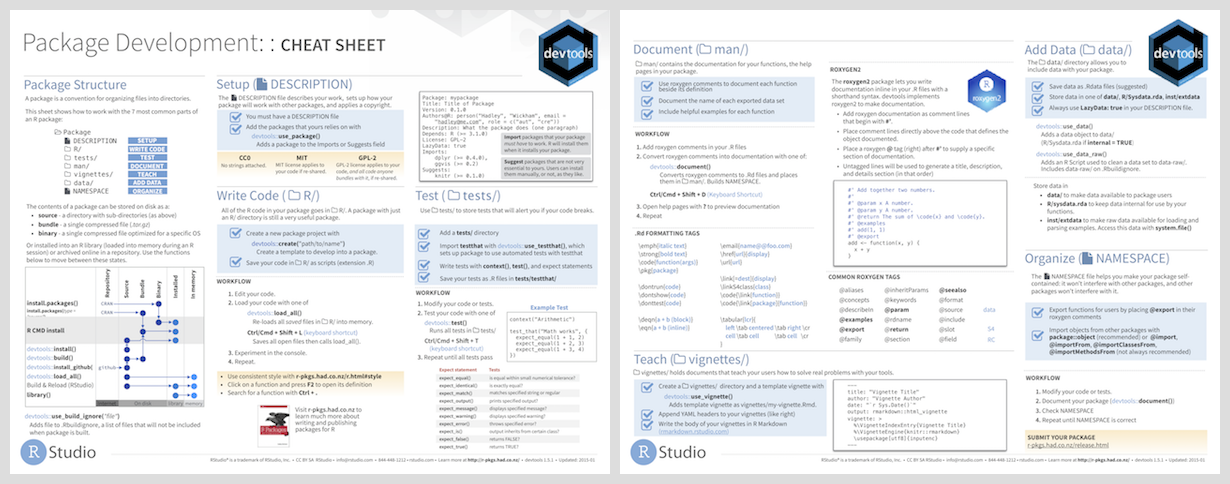The aim of devtools is to make package development easier by providing R functions that simplify and expedite common tasks. R Packages is a book based around this workflow.
# Install devtools from CRAN
install.packages("devtools")
# Or the development version from GitHub:
# install.packages("devtools")
devtools::install_github("r-lib/devtools")All devtools functions accept a path as an argument, e.g.
load_all("path/to/mypkg"). If you don't specify a path, devtools will
look in the current working directory - this is recommended practice.
-
load_all()simulates installing and reloading your package, loading R code inR/, compiled shared objects insrc/and data files indata/. During development you usually want to access all functions (even un-exported internal ones) soload_all()works as if all functions were exported in the packageNAMESPACE. -
document()updates generated documentation inman/, file collation andNAMESPACE. -
test()reloads your code withload_all(), then runs alltestthattests. -
test_coverage()runs test coverage on your package with covr. This makes it easy to see what parts of your package could use more tests!
-
install()reinstalls the package, detaches the currently loaded version then reloads the new version withlibrary(). Reloading a package is not guaranteed to work: see the documentation forunload()for caveats. -
build()builds a package file from package sources. You can use it to build a binary version of your package. -
install_*functions install an R package:install_github()from GitHubinstall_gitlab()from GitLabinstall_bitbucket()from Bitbucketinstall_url()from an arbitrary urlinstall_git()andinstall_svn()from an arbitrary git or SVN repositoryinstall_local()from a local file on diskinstall_version()from a specific version on CRAN
-
update_packages()updates a package to the latest version. This works both on packages installed from CRAN as well as those installed from any of theinstall_*functions.
-
check()updates the documentation, then builds and checks the package locally.check_win()checks a package using win-builder, andcheck_rhub()checks a package using r-hub. This allows you to easily check your package on all systems CRAN uses before submission. -
release()makes sure everything is ok with your package (including asking you a number of questions), then builds and uploads to CRAN.
R package development can be intimidating, however there are now a number of valuable resources to help!
-
R Packages gives a comprehensive treatment of all common parts of package development and uses devtools throughout. The Package structure chapter is a great place to get started understanding the parts of a package and how they work together.
-
RStudio community - package development is a great place to ask specific questions related to package development.
-
rOpenSci packages has extensive documentation on best practices for R packages looking to be contributed to rOpenSci, but also very useful general recommendations for package authors.
-
There are a number of fantastic blog posts on writing your first package, including
-
Writing R Extensions is the exhaustive, canonical reference for writing R packages, maintained by the R core developers.
devtools started off as a lean-and-mean package to facilitate local package development, but over the years it accumulated more and more functionality. Currently devtools is undergoing a conscious uncoupling to split out functionality into smaller, more tightly focussed packages. This includes:
-
testthat: Writing and running tests (i.e.
test()). -
roxygen2: Function and package documentation (i.e.
document()). -
remotes: Installing packages (i.e.
install_github()). -
pkgbuild: Building binary packages (including checking if build tools are available) (i.e.
build()). -
pkgload: Simulating package loading (i.e.
load_all()). -
rcmdcheck: Running R CMD check and reporting the results (i.e.
check()). -
revdepcheck: Running R CMD check on all reverse dependencies, and figuring out what's changed since the last CRAN release (i.e.
revdep_check()). -
sessioninfo: R session info (i.e.
session_info()). -
usethis: Automating package setup (i.e.
use_test()).
Generally, you should not need to worry about these different packages, because devtools installs them all automatically. You will need to care, however, if you're filing a bug because reporting it at the correct place will lead to a speedier resolution.
Please note that the devtools project is released with a Contributor Code of Conduct. By contributing to this project, you agree to abide by its terms.

